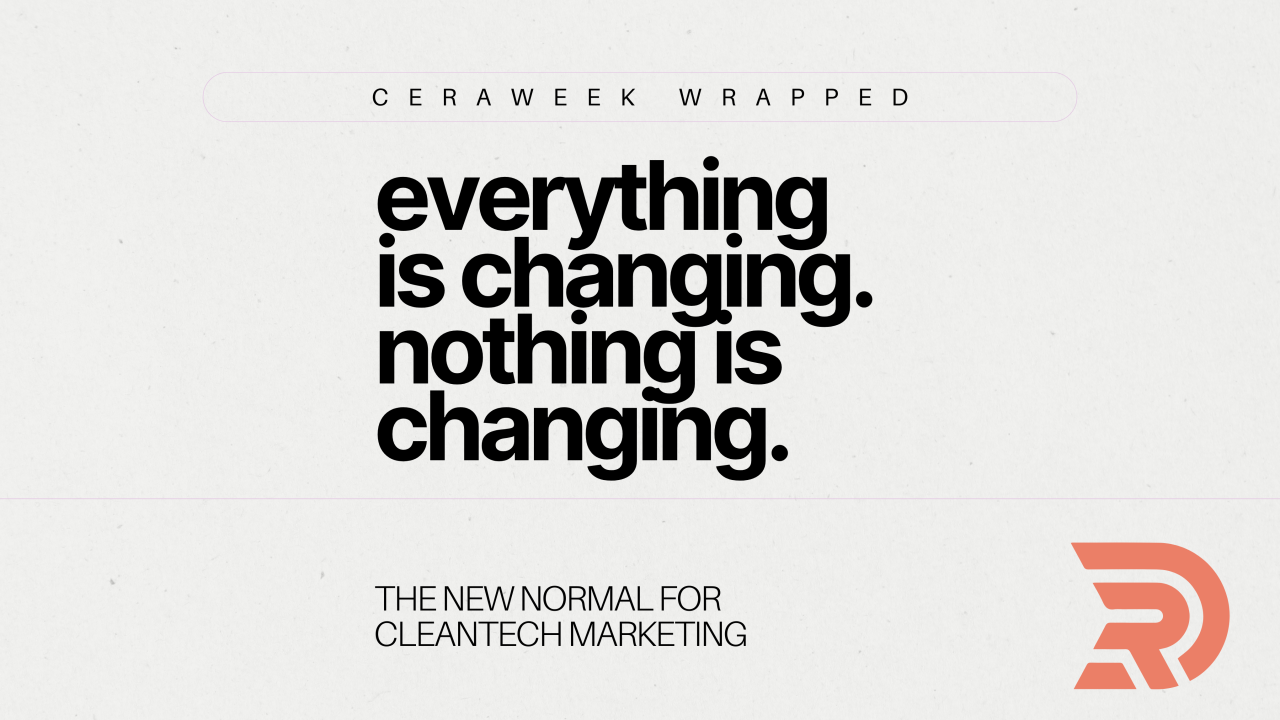Everything is Changing, and Nothing is Changing
If #CERAWeek 2025 reinforced one thing, it’s this: everything is changing, and nothing is changing. Regulations are shifting, incentives are in flux, and the pace of innovation is accelerating. Yet, through all the noise, the companies set to thrive are the ones that frame their value in terms that matter most to decision-makers—business value, operational security, and financial predictability.
Let’s be real–the policy landscape is a mess. Comms and branding teams are scrambling to re-align. Every energy brand we know is working to figure out how to reposition in a world where “climate” has become a four-letter word. But don’t panic-edit.
The companies maintaining momentum aren’t just positioning themselves as "sustainable." They’re the ones that make a clear, undeniable business case—where cleantech solutions aren’t just about compliance but about lowering costs, improving resilience, bolstering national security, and creating competitive advantage.
That’s the shift happening now. The cleantech companies that stand out aren’t reinventing their business models, overhauling their technology, or chasing the latest policy trend. They’re doing what they’ve always done—solving real operational challenges. The only difference? They’re communicating their value in terms that resonate with decision-makers. They’re showing not just why their technology is good for the environment but why it’s good for business.
But before we dive in, we’d be remiss if we didn’t share our top three catalytic moments—insights that cut through the noise and capture where the energy transition (or, ahem, the energy addition) is really headed.
ONE
"A security-driven energy transition moves faster than a climate-driven one." Jeff Currie, Chief Strategy Officer of Energy Pathways, The Carlyle Group . Security. Affordability. Environment. In that order. Companies that align with all three aren’t just positioned for compliance—they’re positioned for long-term success.
TWO
“There is plenty of opportunity even in this climate to let pigs fly.” Robert Stout. The companies that win aren’t waiting for perfect conditions. They’re making their value undeniable—proving ROI, reducing risk, and securing stakeholder confidence. Consistency in messaging is key.
THREE
Collaboration isn’t optional—it’s the model. From geothermal to emissions monitoring to waste management, the strongest players aren’t going at it alone. Across the value chain, partnerships are driving scale, integration, and real-world deployment. This message was echoed by so many that we can’t even pin it to one source.
The Shift: From ‘Climate-Smart’ to ‘Business-Smart’
What works? A business-first framing.
The cleantech companies that win are the ones that move beyond policy-driven messaging. They’re not marketing based on policy; they’re making the case to CFOs, supply chain managers, and investors. They’re proving their technology isn’t just viable—it’s a competitive advantage.
Why Some Cleantech Companies Are Breaking Through—And Others Aren’t
The companies gaining market traction are doing three things differently.
First, they’re owning the financial narrative. They’re not waiting for mandates or subsidies to justify their worth. Instead, they’re making the case upfront—quantifying cost savings, reducing exposure to volatility, and improving operational efficiency. This isn’t just about marketing; it’s about framing clean technology as essential business infrastructure.
Second, they’re backing up their claims with real-world results. The companies that stand out aren’t the ones making promises; they’re the ones publishing case studies, securing industry pilots, publishing tech livestreams, showing up in person at events, building legitimate partnerships, and showcasing measurable ROI.
Finally, they’re positioning their technology as part of a broader economic shift, not just an environmental one. The energy addition era is happening, but not in a straight line. The companies making the biggest impact understand that security, affordability, and sustainability are interconnected—not competing priorities but reinforcing ones.
Positioning Your Cleantech Company for Market Leadership
The best technology doesn’t always win. The best-positioned technology does.
If your messaging is still built around broad sustainability goals, it’s time to recalibrate. The companies defining the next phase of energy addition aren’t leading with environmental impact—they’re leading with business impact.
At R&D B2B Marketing, we help cleantech and energy companies move beyond policy-driven messaging to frame their solutions as business-critical investments. If you’re panic-editing, we can help.

